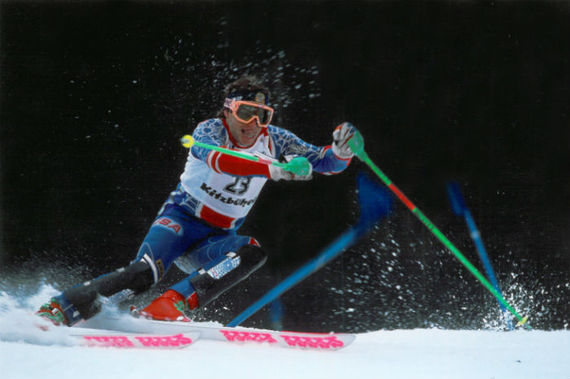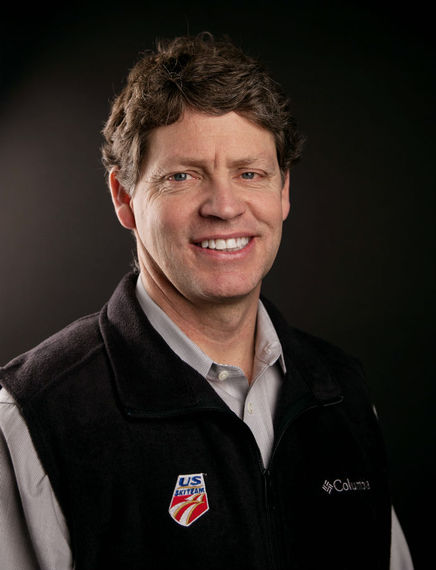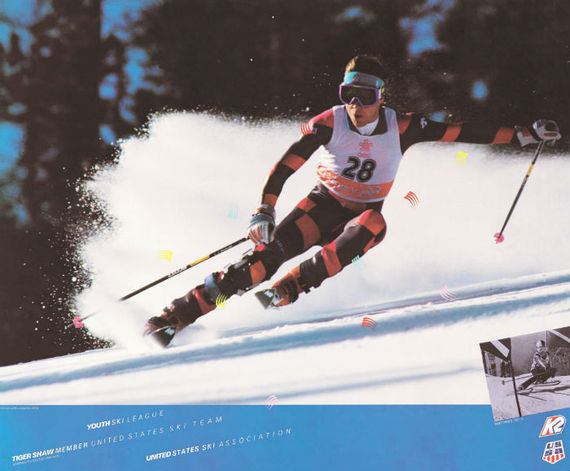It's his name that strikes you first: Tiger. They don't call it the "eye of the shark," or lion, or bear. It's "eye of the tiger," and it seems to strike the cord and essence of competitive sports in the fullest and purest way.
Tiger Shaw, a two-time Olympian, became the CEO of the United States Ski and Snowboard Association (USSA) in March 2014. The teams had a blazing start this season.
Tiger made the team in the early 1980s and skied in two Olympics: 1984 in Sarajevo and 1988 in Calgary. He won nine U.S. Championship titles, regularly finished in the top 10 at World Cups, and held top-15 world rankings in two disciplines.
This past November, I met with Tiger after this year's team announcement at Copper Mountain, Colorado. Olympic gold medalists Ted Ligety, Lindsey Vonn, Bode Miller, and Mikaela Shiffrin were on stage among nearly 50 athletes named to this year's team. Here's more from my talk with Tiger.
What's your primary responsibility?
Results and money.
Which is more difficult?
I can directly influence the money, whereas our coaches directly influence the results. However, through our strategy, we can dramatically influence our long-term results--in other words, developing young kids.
It's a long-term necessity to have a great developmental pipeline, so we're highly focused on that, as well as developing us as an association and connecting with all who want to be a part of it.
For instance, take the kid that grew up playing football. He or she is a lifelong NFL fan, and we want to connect with our fans. We want to incorporate them, we want to include them, we want to grow their numbers for the sake of the strength of the sport. Pro sports do a very good job of that, and we need to do better.
How is the team looking this year?
Extremely strong, and of course we are very hopeful.
How big is it for our racers to have the World Alpine Champs held in the States?
Critical. It's pivotal to the success of our alpine team. Alpine skiing is a sport very contested in Europe, so getting the Europeans on our turf is a big deal. It's the home away syndrome, but fortunately we're also pretty darn good at away games.
Can a home audience act as a "12th man" in ski racing?
It feels really good, and it helps a lot.
You raced 10 years on the team, talk about your worst crash?
I got hurt a lot but they were rather unimpressive falls. But there was a downhill crash in Alyeska during the U.S. Nationals and the next day I was on the operating table in California. I caught an edge going 60, and it caused the vehicle to leave the road, me being the vehicle, the road being the course. [laugh]
Where did you land?
Next to the fence. [laugh]
How do you put that out of your mind the next time you're in the starting gate?
The road there is a game of retraining your muscles to do what they were doing before you got hurt, and when all of that clicks again, you forget about the injury.
Talk about your proudest race performance, what was it, what did it feel like?
It was a World Cup race that I finished sixth place, I finished third after one run, and it was far from home in Slovenia. And my eleventh-place finish in the '88 Olympic Games in Calgary. So I'm a little bit like Billy Bean--I almost got all the way there, not quite, but I'm still trying.
Talk about the mindset of a ski racer as they prepare for the Olympics.
The athletes themselves are always looking forward. So the best way to look at it is that the Olympics are the same old races, every four years in a two-week period. They're called the Olympics, so they are 25 times more important and valuable, but you can't approach them that way.
You have to approach them like any old race. I guess the best way to look at it is: if there is something different that you can do in the Olympics that helps you perform better, then why aren't you doing it every day?
Over the past 20 years the U.S. Ski and Snowboard Team has been winning more races. What do you attribute that to?
It's true, we have more depth, more medal winners than ever, and we're dominate in some of the new sports, slope-style skiing for instance, half-pipe skiing, and we've always been strong in snowboarding.
So would you say the investment in the Center for Excellence has paid off?
It's paid off in spades, and thanks to Bill Marolt's vision. He made it happen.
So what's the overall vibe like in the Center?
It is an amazing World Class facility, but its true power is the way it brings together our athletes and staff, because then you get the multiplier effect of people. It's an awe-inspiring place to be.
So what's your office environment like? Are there ski racers running around in spandex all day?
It's very typical in some ways, but all I have to do is go down one floor, to the athletic floor... Let's just say we have the best gym in Utah. Occasionally we have times that our HR Director is spinning on a bike next to Ted Ligety...and I mean, they probably couldn't be more juxtaposed to each other, it's funny. [laugh]
Athletes are very active on social media. Does it become a distraction?
I'm a dinosaur relative to social media, but our young athletes are not. It's natural and second nature to them. So it's easy for them.
What happens to the ski racers that try but don't quite make it?
There's a tremendous amount of programs that they remain involved in around the country. And there are many different circuits that you can race on.
Most people, after they've decided that they've gotten as far as they can, they either parlay those skills in another career inside of outside of the ski industry. We hope they stay in coaching because it's critical to have great coaching in our clubs.
And do many of them continue to coach?
Yes, sometimes they are a full-time parent volunteer coach, many of the programs depend heavily on ex-racer parents, but it's very efficient that way.
What goes through their head as they near the end of their career?
In ski racing, no one ever counts their chickens too early. That's why a lot of these athletes, when they talk about the end of their career and when they're going to retire, a lot of them don't know. A lot of time, you're just looking race to race, season to season, and you're constantly re-evaluating. It's usually a spring-time decision.
How can people help contribute to the team's future success?
Get kids involved, contribute financially if you are interested and able, and most importantly follow us closely, be an advocate for us.
From your view, is the overall sport growing in popularity or declining?
It's seems to have grown considerably, thanks to our superstars. Lindsey, Bode, Ted, Mikaela, Julia, they have transcended our culture and have kind of penetrated through the media noise so they make mainstream media now and then, and that wasn't always true before. They are very compelling, competitive personalities.
It's tough to raise a ski racer, what advice would you have?
There are many great clubs that help to reduce the cost, try to keep the travel down, do more with what you have at home.
So small town hills play a big role?
They are a very big factor.
You grew up at Stowe. What's the strategy on a powder day there?
Yea, skier's left off of gondola, it's called Angel Food. In between Goat and Nose Dive, and a couple of other secret places that I can't divulge because we want to get there first. There are all kinds of nooks and crannies.
Do people call you Tiger Woods?
Well, I do know that I had the name before he did because I was given that name in 1962, and he was not even a twinkle in anybody's eye yet. [laugh]
Do you know of any other Tigers or do you consider yourself the OT, the Original Tiger?
I was nicknamed for convenience. I have the same first name as my grandfather and father, I was the third, and it stuck. There was no particular reason to start Tiger, but they did.
You've watched plenty of young kids transform into successful career ski racers. What are the ingredients?
The 10,000 hour rule applies.
Explain the 10,000 hour rule.
Ah, ski as much as you can. And all skiing counts, wood, moguls, all mountain, gates.
Ha, now that's a rule that should never be broken! Thanks Tiger, we'll be rooting for the team!
In early January 2015, the U.S. Ski Team lost two ski racers in an avalanche accident in Soelden. Tiger Shaw responds, "Ronnie and Bryce were both outstanding ski racers who were passionate about their sport, both on the race course and skiing the mountain. Our hearts go out to the Berlack and Astle families, as well as to their extended sport family. Both of them loved what they did and conveyed that to those around them."
By Troy Hawks / @HawksSquawk



